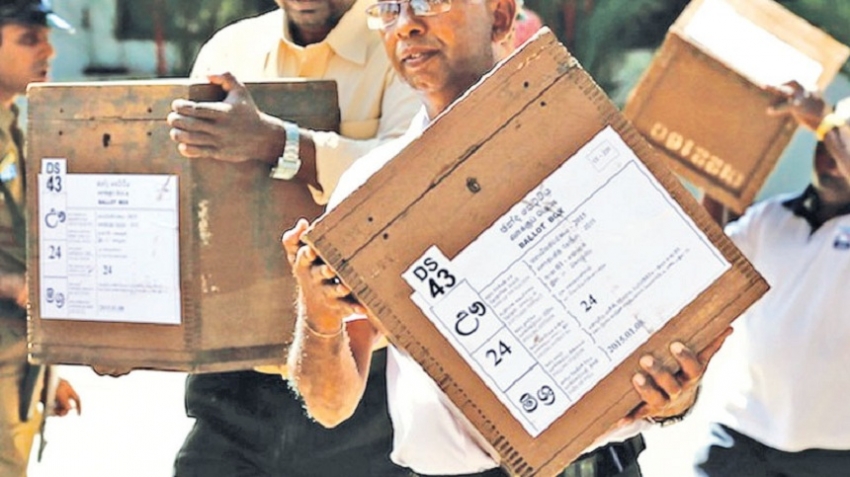Yet another political typhoon is just about to trickle the country churning the sea of emotions of the voter at times into angry peaks. People often seem to let their obdurate emotions to control their political life instead of reason that leads them to work for their political party sensibly with well-grounded and well-founded behaviour patterns.It has been experienced in Sri Lankan political scenario that during the heat waves of political atmosphere when elections are around the corner, they join dozens of others performing doughty, gusty callisthenics in support of their candidates.
They become so absorbed in or attached to their political party in such a way that they even tend to treat their own neighbours, friends and even relations like their arch-rivals or enemies, irrespective of the social bonds established by the cultural ties and value system of the country. It is therefore quite interesting to see what aspects of the nature of the human mind that ignites passions in them to produce such pangs of anger and hatred. What is paradoxical is that while their politicians whichever party they belong to leisurely enjoy either the win or defeat, it is the people who smart both in their gain and loss.
Moral outrage
Can anger be born out of compassion? The common argument voters bring in as the main reason for their becoming emotional is their compassion for the fellow citizens of the country. When they give air to their emotions to criticize either the government in power if they are in the opposition or the opposition if they support the government in power, they sublimate their emotional outrage on the grounds that they are bound to safeguard their people or the motherland. This then raises the question whether this moral indignation or outrage can be justified in the name of the people or one’s motherland.
If their outrage is directed against an outrageous government or a politician or injustice inflicted on the people by a regime or a ruthless ruler, one may be at a loss to decide whether it is right or wrong; justifiable or unjustifiable. However, if this situation is looked at from the psychological perspectives or those of any religion, this moral outrage is born out of aggression, wrath and ferocity, which must be done away with for the formation of a morally bound society. Thus, the general public must understand that creating such a good society is rooted in their strengths they project to form a democratic, peaceful society.
Positive emotions
Cultivation of patience and forbearance is essentially important to convert one’s destructive emotions into positive ones. This does not necessarily mean that the main duty of the public is just to let the things happen the way they do and look into their affairs by completely showing ignorance of injustice.
Why can’t people transform their anger into compassion and patience so that they can think of prudent and effective strategies to express their opinions and govern their behaviour? Emotions are inevitably very useful weapons to overcome one’s problems and to refine one’s behaviour without giving went to anger. When an individual becomes aggressive for anything, he more or less gains pleasure, joy and pain. When he tends to think that he does his moral duty for the country, he is happy, but the turbulent and aggressive behaviour itself smothers his life with uneasiness, fatigue and unhappiness. The way to overcome this situation is to develop an emotional equilibrium.
Emotional balance
Faced with the emotional attacks coming from within and mounting pressure from outside to serve for the nation during the election period or at any time, it becomes an extraordinary task to work with an emotional balance. One way for us to find a solution is to look at it from the fundamentals contained in Buddhist chronicles. Emotional imbalance is a result of attachment. Therefore, when one is working with a mere attachment he is endangering his own life and that of the others disregarding the destruction on the very moral fibres of the society.
The voter must be cognizant of his own emotions before he pays his attention for the purification of social or political debasement. Another useful method is to refine one’s behaviour (or political behaviour) through four sublime states namely, Love or Loving-kindness (metta), Compassion (karuna), Sympathetic Joy (mudita) and Equanimity (upekkha). When you develop equanimity, you come to a situation in which you feel that you are in a state of not being angry and not being attached which in turn helps you to make rational decisions to mould your behaviour.
‘Be kind to one another, tender-hearted, forgiving each other, just as God in Christ also has forgiven you’ (Ephesians 4:32) is a bible quote which shows the value of developing compassion for others. If you are a Catholic or a Christian, you are serving God in whatever behaviour you show to others. “O You who believe! Enter absolutely into peace (Islam). Do not follow in the footsteps of satan. He is an outright enemy to you.” (Holy Quran: 2, 208). All these quotes boil down to one simple truth: patience, tolerance, love and compassion. Therefore, the best way for us to develop an emotional balance is to shape our behaviour by enhancing our faiths in our respective religions.
“These violent delights have violent ends
And in their triumph die, like fire and powder.”
- William Shakespeare




















